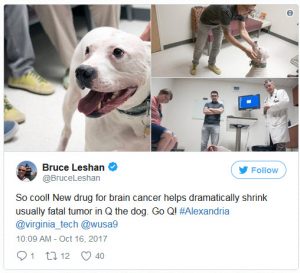
Two newswires (at least) have picked up the story of Q, a pitbull who is showing remarkable progress in her treatment for her brain cancer. Below are the two stories we found. Please click on the links for the videos.
From Idea Station:
Researchers at the Virginia-Maryland College of Veterinary Medicine at Virginia Tech are having success with a brain tumor treatment for dogs that may someday be used in humans.
Mark and Meg brought their dog Q Bentley to the clinic in March with a brain tumor that would have killed her
“A lot of gliomas affect young to middle-age dogs, just like Q,” said John Rossmeisl, professor of neurology and neurosurgery and principal investigator. “Obviously we want to evaluate the safety in animals, but considering how similar the tumors are between a dog and a person the goal would be to extrapolate that safety data to apply to people.”
A modified chemo drug was injected directly into the tumor, and in Q’s case it worked.
“So if you look at Q, she is not only alive four-months after, she is clinically normal.”
The clinical research is to determine dosages that are safe and that work.
Researchers at Virginia Tech say the kind of cancerous tumor that hit Q is similar to glioma brain cancers in humans. So what’s working so well for Q may soon be used to treat people.
From: WUSA-TV
WASHINGTON (WUSA9) – “Q” the dog is making a miraculous recovery.
Just months after she was diagnosed with a deadly brain cancer, the young pit bull from Alexandria is responding well to a remarkable new treatment.
Researchers at Virginia Tech say the kind of cancerous tumor that hit Q is similar to glioma brain cancers in humans. So what’s working so well for Q may soon be used to treat people.
Virginia Tech’s John Rossmeisl is really excited about Q’s recovery. Back in March, the usually energetic young pitbull got forgetful and whiny and eventually suffered a seizure. A $3,000 MRI found glioma brain tumor.
The prognosis was terrible.
“If a dog with a glioma receives no specific treatment for that tumor, the average survival is about two and a half months,” said Rossmeisl, a professor of neurology and neurosurgery at the Virginia-Maryland College of Veterinary Medicine at Virginia Tech.
Rossmeisl infused “molecularly- targeted cytotoxin” directly into Q’s tumor. The chemotherapy drug binds only to the proteins coating the surface of the cancer cells. It doesn’t hurt the healthy cells nearby.
“These drugs are designed to bind to those proteins and then the payload that’s present gets imported into the cancer cells,” said Rossmeisl.
Q has responded incredibly well to the new chemo and treatment method. Her tumor has shrunk dramatically and she’s feeling much better.
“To six weeks, it shrunk by 50 percent,” said Rossmeisl. “And then from the initial follow up to the four-month follow, it shrunk another 50 percent.”
This is the same kind of cancer that killed Sen. Ted Kennedy and former Vice President Joe Biden’s son Beau. It’s the same type of glioma that Sen. John McCain is fighting.
Researchers have used similar drugs in humans, but the drug and delivery method that have saved Q are showing much more promising results.
This is just a Phase One trial, designed to determine the right dosage of the new drug. And some dogs have responded much better than others. But there are a number of pets who have seen the same kind of recovery that Q has seen. And that is super promising.
The numbers are really scary. Four percent of dogs will get cancer at some point in their lives. And this deadly kind of glioma is the second most common.
If your dog has glioma, he or she can participate in the trial. You have to pay for the initial MRI to confirm the diagnosis and you have to cover the travel costs to Blacksburg.
But all the treatment and follow-up is free.
© 2017 WUSA-TV
For the videos, please click these links:








